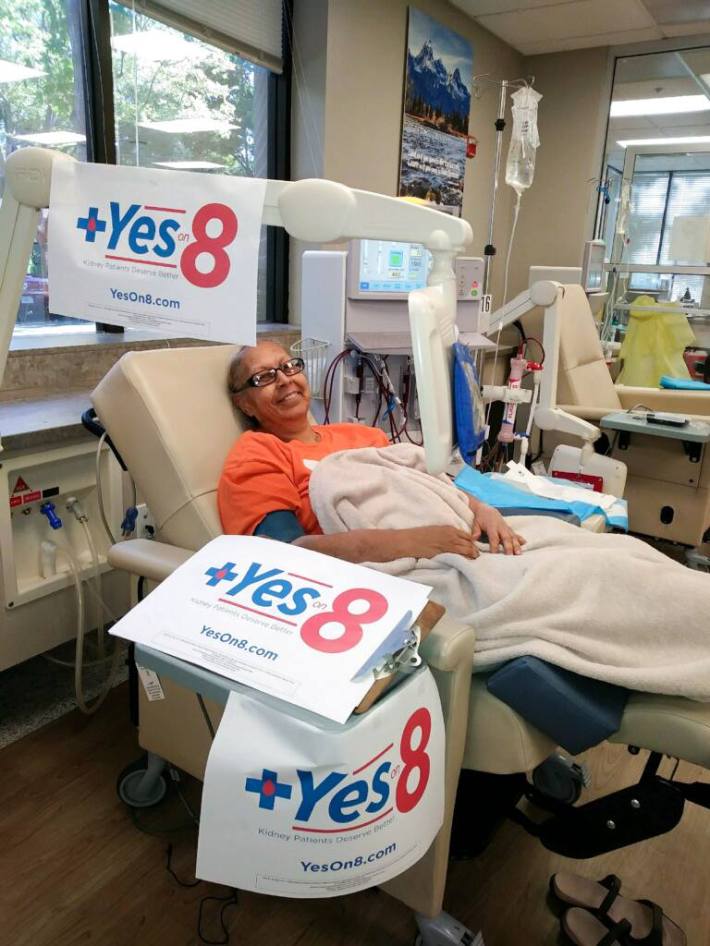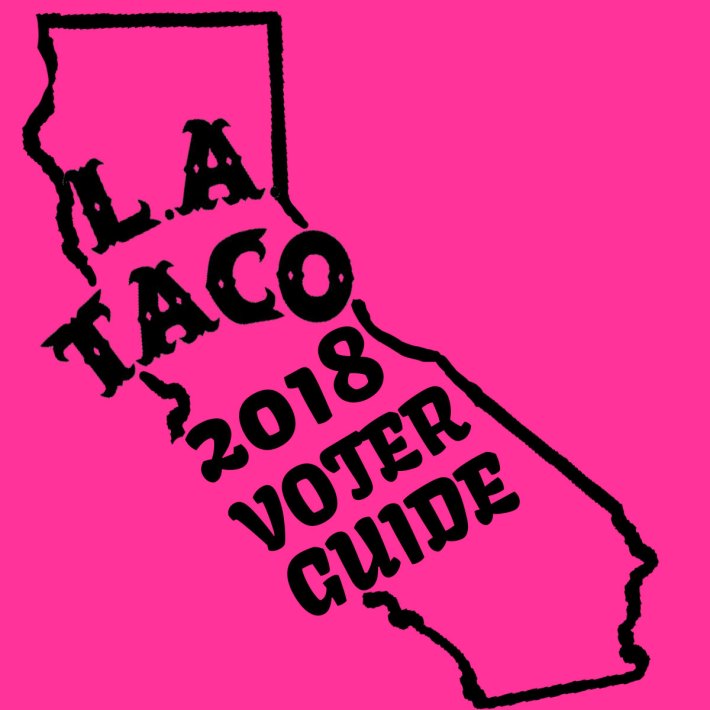Here’s Part 5 of our L.A. Taco Voter Guide, focusing on Prop 8, a ballot initiative that would limit the amount of money private dialysis companies can charge patients with kidney disease.
[dropcap size=big]T[/dropcap]hree times a week for four hours at a time about 140,000 Californians with kidney disease have to sit in a medical clinic while a machine removes toxins from their blood, and then returns their own blood, cleaned of toxins, to them.
The procedure is called dialysis, and from 2009 to 2016 the number of Californians getting dialysis treatment rose by 46 percent. With it, the number of dialysis clinics in the state grew from 420 to 543.
Seventy percent of those patients go to clinics owned or operated by only two private companies, DaVita and Fresenius, and it just so happens that both companies make a lot of money off those people, like $1.8 in billion pretax profits last year for DaVita, and $2.3 billion for Fresenius type money.

Prop 8 wants to limit those profits by limiting the amount of money dialysis clinics can charge to 115% of the cost of the procedure itself. Forcing private dialysis clinics to reinvest in both clinic upkeep, staffing, and pay raises for clinic staff, along with forcing the clinics to treat and charge every patient, no matter who their insurer is, the same.
“We want this industry to do better by its customers and workers. We trust voters to know that companies pulling in $4 billion in profit are not looking out for people,” says Sean Wherley, spokesperson for SEIU-UHW, one of the largest healthcare workers unions, and the main supporter of Prop 8.
For years SEIU-UHW has tried to unionize staff at dialysis clinics, many of whom are technicians, who make below a livable wage. The clinics have aggressively stamped out unionizing efforts, and Prop 8 is in part an effort by SEIU-UHW to get back at DaVita and Fresenius.
SEIU-UHW has been successful in using the proposition system to go after big business and fight for better pay and conditions for workers. In 2016 they were a big part of the coalition that collected signatures for a proposition to raise the state’s minimum wage to $15.
The dialysis industry isn’t looking to compromise though. Davita and Fresenius, along with smaller dialysis clinic companies, have raised close to $100 million to fight Prop 8. SEIU-UHW, and a smattering of other supporters like the California Democratic Party have raised a little bit more than $20 million.
[dropcap size=big]A[/dropcap] lot of that money raised by the dialysis industry seems to have gone into TV advertising. If you own an TV, you’ve probably seen the ads, multiple times per commercial break. It usually stars a group of doctors, nurses, or an older person. There’s usually a dialysis machine in the background, while they talk about how if Prop 8 passes, dialysis centers will close and put patients at risk of not getting proper care.
“What usually happens is, these centers close in the communities that need them the most,” Linda Ross told L.A Taco. Ross is president of the National Hispanic Medical Association, one of the few medical groups on the No on Prop 8 coalition. Adding the cap on profits, clinics won’t be able to reimburse their costs, and will simply close up in low income communities and communities of color, the group argues.

“There’s no way to know if clinics will actually close down, but on its face, it doesn’t sound like that will be an immediate effect,” Glenn Melnick, a professor specializing in healthcare finance at USC’s Price School of Public Policy, tells L.A. Taco.
Prop 8 itself seems to not be fully thought out legislatively, he adds, and that he’d rather have legislatures and experts devise a national public health policy to deal with regulating dialysis clinics, and kidney disease treatment, across the country.
In 2010 ProPublica published an investigation on the dialysis industry. They found that surveyors inspecting 1,500 clinics across the country called almost half of them “filthy” and unsanitary, exposing patients to a range of infections including hepatitis, staph, tuberculosis, and even HIV. They also found that one in four patients died within the first year of dialysis treatment.
More recently, Washington Monthly writer Anne Kim wrote a long and detailed piece about the price: material, medical, and psychological, of dialysis treatment, and the clinics that provide them in poor communities of color.
Kim notes that a majority of folks on dialysis are poor and black. She also points out that if you’re white, wealthier, and have a private insurer, more likely than not you’ll be diagnosed with kidney disease earlier, and be given the opportunity to get a kidney transplant.

The distinction between the ways people pay for dialysis treatment is an important part of Prop 8.
In the early 1970s, President Nixon signed a measure establishing a provision in Medicare that allowed people below the age of 65 to sign up for Medicare, and receive full treatment if they had end-stage kidney disease.
Since then Medicare has paid a flat rate to clinics for dialysis treatments, and although the price was kept relatively low, the amount of new patients able to afford treatment grew the dialysis industry into the multibillion dollar machine it is now.
Folks on Medicare got a baseline treatment, with the government paying a baseline price to the clinics. Folks on private insurance programs got billed even more for the same treatments, making the clinics even more money. “What happens in California is the future of the country,” Ross of N.H.M.A. said. “Especially health care policy.”
And that’s why the dialysis industry is so scared of Prop 8 passing.
* Post updated.
LA TACO VOTER GUIDE 2018:
Part 1~ Proposition 10 Clears Hurdle For Rent Control
Part 2 ~ Gas Tax Measure Proposition 6 Is All About Hopes of a Republican Revolt
Part 3 ~ Props 1 and 2 Are for Affordable Housing but Come at a Cost
Part 4 ~ Measure B Could Eventually Keep Local Tax Dollars Out of Major Private Banks






